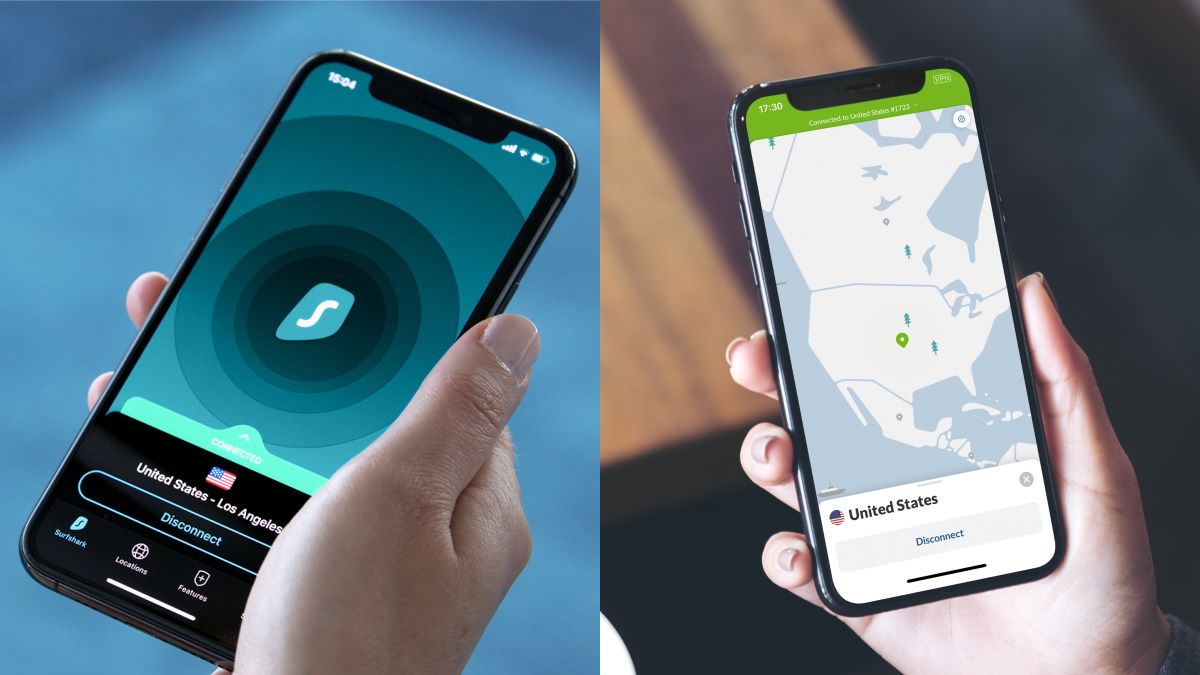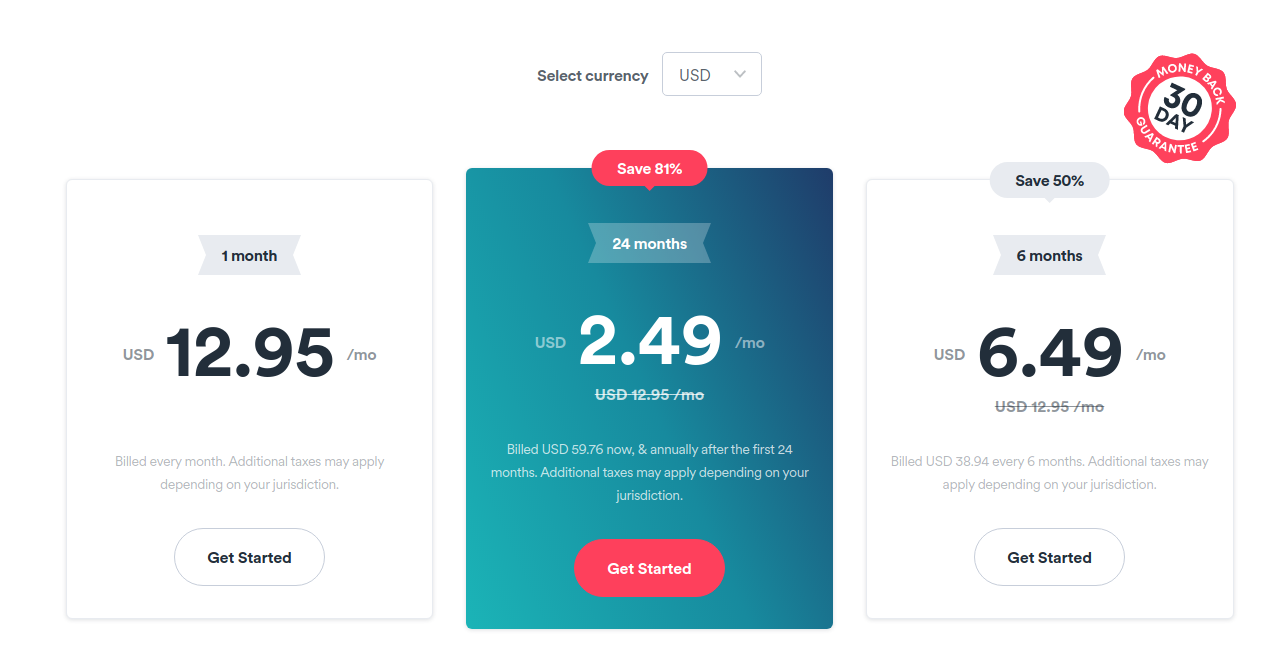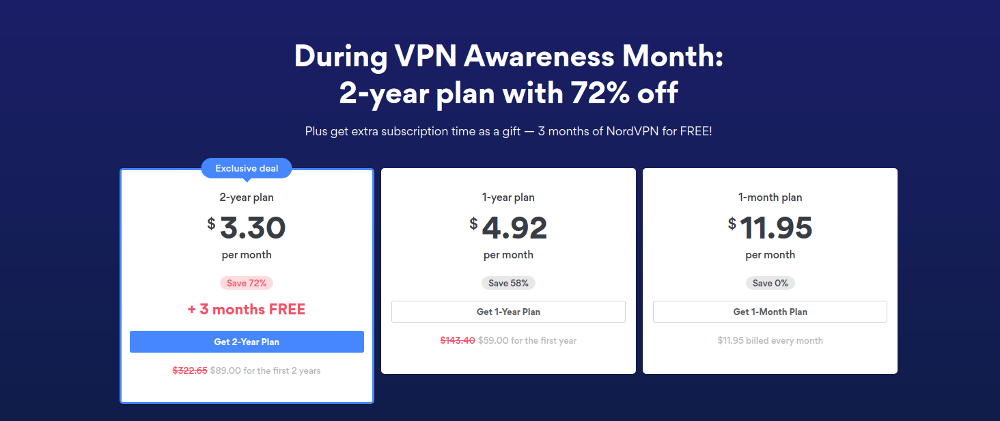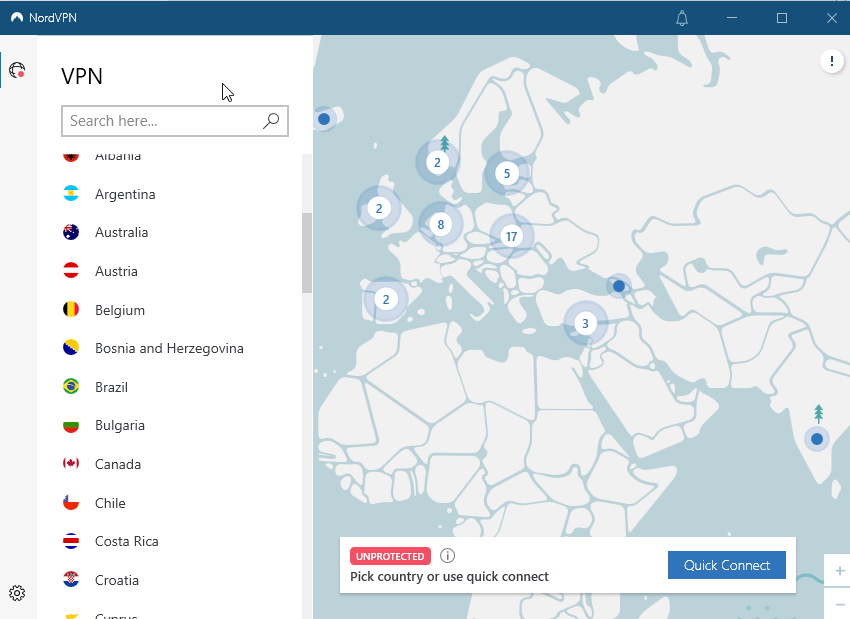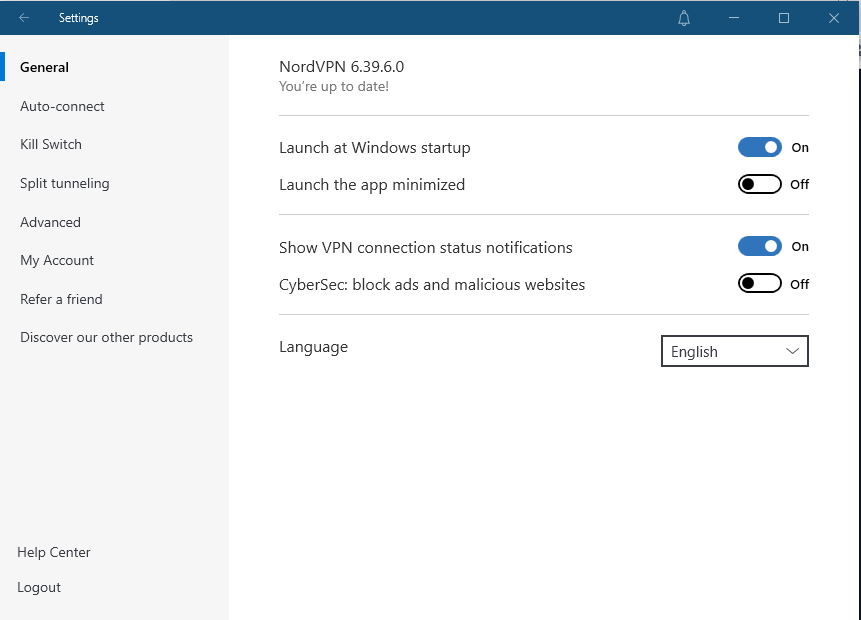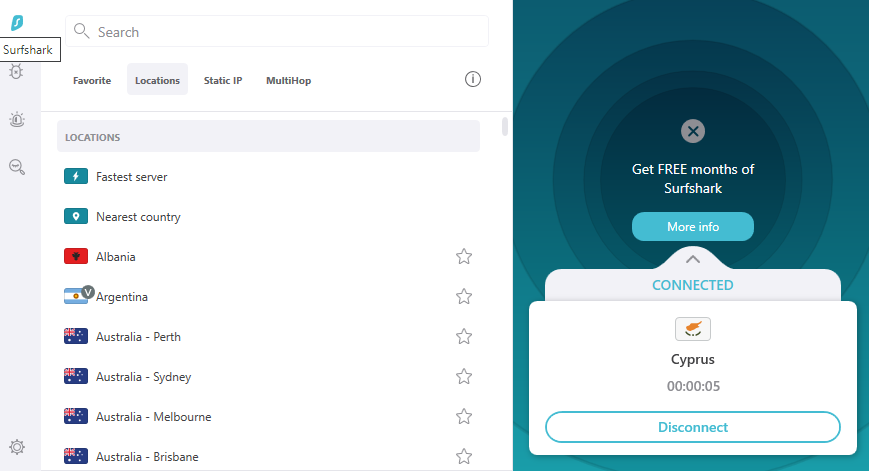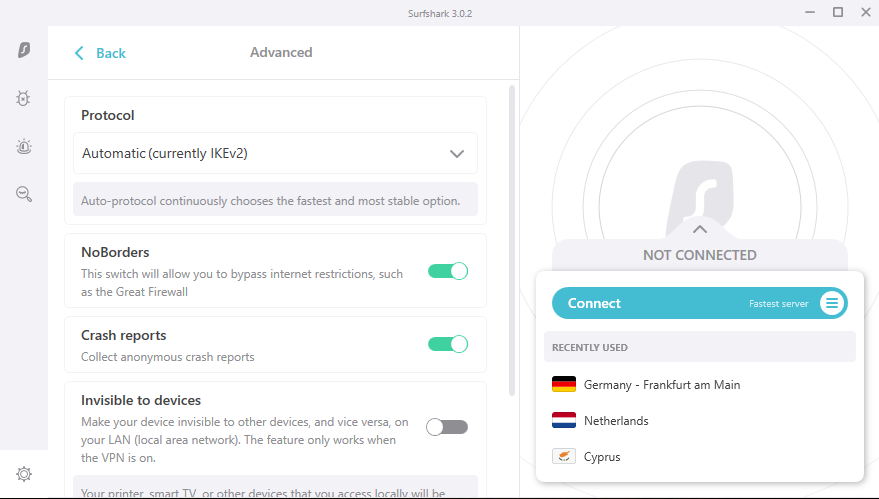If you're shopping for the best VPN, Surfshark and NordVPN are two names you're bound to come across. Both have strong advertising campaigns: NordVPN dominates every single medium out there, from YouTube videos to TV, and Surfshark is no slouch, either.
In this article, we'll try to see past the marketing and figure out which of the two is the better VPN for you.
Be aware that, as of February 2, 2022, NordVPN and SurfShark are now owned by the same company. However, they remain two separate brands with different products.
Surfshark vs. NordVPN Features
We kick off our comparison by looking at the features Surfshark and NordVPN offer. The basics are all there for both, meaning you can select a server in any number of countries and connect to it through a secure tunnel. (That's a simplified explanation of how VPNs work.) We've had no significant issues using either service, but that doesn't mean there aren't some differences, either.
Security & Encryption
The biggest difference between NordVPN and Surfshark when it comes to security is the default VPN protocol each maintains. NordVPN's default is NordLynx, which is a proprietary protocol based on Wireguard, a cutting-edge protocol that guarantees both speed and security. Surfshark, on the other hand, has as its default IKEv2/IPsec, which is fast but has some security flaws.
In both cases, you can switch between the default protocol to something like OpenVPN, which is generally considered trustworthy, but we do feel it's a strike against Surfshark that it sets a questionable protocol as its standard.
That's pretty much it for the bad news, though. Both services offer plenty of interesting security features that should help keep you safe, ranging from the standard, like a kill switch, to more advanced options, like multi-hop connections.
The upshot is that both VPNs will keep you safe while online, though we do recommend switching protocols when using Surfshark. Other than that, when we tested the VPNs, both passed all the security tests we ran.
Speed and Server Count
Speaking of testing, we also ran speed tests on both NordVPN and Surfshark, and we weren't particularly impressed in either case. As we explain in our article comparing NordVPN vs. ExpressVPN, NordVPN's speeds boil down to whether or not you get a good server. If so, it's lightning-fast. If not, it slows to a crawl.
Surfshark is more consistent, but its speeds can only be described as average, generally only offering about half the speed of what NordVPN's faster servers can deliver. While taking the slow-but-steady notion may be good advice in many other areas of life, it's unnecessary when it comes to VPNs as there are plenty of other services that offer both speed and reliability.
The upside is that, if you just need a VPN to keep yourself safe online, then both services will have you covered with a nearby server. Both networks are extensive: NordVPN has over 5,000 servers in 60 countries, while Surfshark boasts 3,200 in 65 countries. With such a wide network, you're bound to find a server within a few hundred miles, especially if you're in Europe or North America.
Netflix and Other Streaming Services
If you're looking to use either NordVPN or Surfshark to get into other countries' Netflix libraries, then get ready to be disappointed. A recent crackdown by Netflix has made it hard to watch Netflix with any VPN, but some have fared a lot better than others. ExpressVPN, for example, still manages it on some of its servers.
We've heard NordVPN does relatively well with Netflix, but after testing several servers, we had no luck. Seeing how many servers there are and the trustworthiness of our sources, however, we're willing to still give it a half-hearted endorsement.
Surfshark, though, seems to be struggling badly with Netflix's new VPN detection system---one it didn't handle all that well even before the update---so you may want to give it a pass if entertainment is the main reason you're signing up for a VPN.
Torrenting
Another important use for VPNs is torrenting, which both Surfshark and NordVPN can handle. NordVPN even has a whole suite of servers especially for P2P traffic. Though we're not sure if it matters whether or not you have special servers, we guess it's a nice touch.
Surfshark seems to have advertised special servers in the past, but no longer does so. We assume this means you can use any server for P2P activities. In the end, though, all that matters is that you have a good connection speed and a working kill switch. If you want to torrent, either service will do.
Getting Past Censorship
The last feature we'd like to go over is advertised rather heavily by Surfshark, namely the ability to get past China's internet blocks. This feature is called NoBorders, and we're not exactly sure how it's supposed to work: according to Surfshark, they are special servers meant to get you past censorship.
That's pretty interesting, since, as far as we know, pretty much any server can get past a censorship block as long as its IP isn't being monitored by the Chinese government. Though we won't go so far as to say you shouldn't use Surfshark for this purpose, we do find this kind of advertising to be a little misleading. You don't need special abilities to get past censorship blocks.
Overall, the feature packages of our two contenders are very similar, at least on paper. However, in practice, NordVPN inches ahead thanks to better speeds and better Netflix access. There is a price to be paid for that, though, as you'll see in our next round.
Price
When it comes to pricing, NordVPN vs Surfshark proves an interesting choice: Surfshark may offer less impressive features, but is a lot cheaper at $2.49 per month on the two-year plan.
NordVPN may have better features in some areas, but at $3.30 per month when signing on for two years it's also a lot more expensive.
On top of that, here's another thing to keep in mind: when renewing NordVPN, you'll be paying $322 for the two-year plan as the initial payment is just a promo. Surfshark, on the other hand, just changes the initial $60 and changes it into a yearly payment after the first two years. Though both providers pull a bait-and-switch on you, Surfshark's isn't as bad.
When it comes to value, Surfshark is probably the better bet if all you need is some extra security and nothing else. However, if you want the full package, NordVPN is the better pick of the two and is well worth the extra 80 cents or so per month.
Interface
When it comes to ease of use, there's a lot to say for either service. We have always liked NordVPN's approach with its interactive map that allows you to select a server by either clicking on a country or selecting one from a list on the left of the screen.
Settings are just as well laid out, with a nice menu that gives you a clear idea where things can be found. Generally, messing around with settings is pretty easy with NordVPN, and it usually explains what things are and what they do.
Surfshark's main interface is just as good as NordVPN's. It may not have the map, but in daily use it's just as easy to connect to a server and get started. However, server connection times are a bit slow.
The settings menu isn't as good: It's a lot more basic than NordVPN's, and there's less explanation, too. While you could argue it makes Surfshark easier to use because there are fewer options, we prefer it when our software is a bit more on the tweakable side.
When it comes to ease of use, both are great, but we prefer NordVPN a little because it has a better settings menu and connection speeds.
Privacy
When discussing privacy, both Surfshark and NordVPN come out looking like solid no-log VPNs. Both claim not to keep logs, never share information and everything else we've come to expect from VPNs.
As we have discussed before, though, all you can do is take a service at their word that they're not sharing or selling data, it's practically impossible to prove it, or enforce it: Surfshark is based in the British Virgin Islands, and NordVPN is based in Panama. As both services are happy to tell you, this means they're far from FBI warrants requesting users' data, but also from regulatory oversight.
That said, Surfshark's privacy policy is a robust, comprehensive document. We like its attention to detail, with our favorite feature being the massive table of the types of data it handles, what is stored, what is shared, and with whom. Too few providers of any stripe inform customers this thoroughly, and we appreciate it a lot.
NordVPN, in contrast, is a lot more terse. Rather than a table, its privacy policy goes through data types in a list, which works just as well, we guess, but doesn't give the same overview. One advantage NordVPN does have over Surfshark is that it undergoes regular security audits of its workings, while Surfshark only has them for its server architecture.
The Verdict
Making the choice between NordVPN and Surfshark depends on what you need it for. If you need a cheap VPN for some added security, Surfshark is the best option, despite its average speeds.
If you need a VPN to do a little more, like get you into Netflix and other streaming services, then NordVPN is the better choice, at least for the initial two years.
After that, NordVPN just gets too expensive for what you get, and we recommend finding another VPN when your first subscription runs out.

Surfshark
SurfShark is our favorite budget VPN, but it's not as fast as NordVPN. It's also struggling more to get around Netflix's latest VPN blocks.
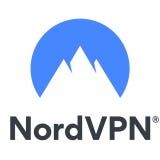
NordVPN
NordVPN offers faster speeds than Surfshark, and it's also better at getting you into Netflix. However, it becomes substantially more expensive after the first two years.

